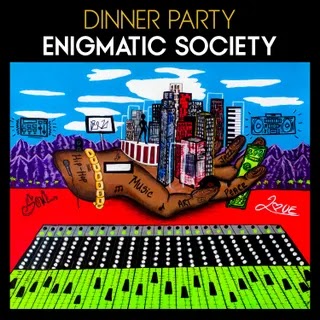The Miami singer moves through her debut album with a sense of self-assurance that doesn’t allow her to look into the rearview at missteps.
Jenevieve was born with an old soul. In interviews, she’ll talk about how her library is filled with oldies because of her parents and geek out over Zhané. One of the first songs she remembers hearing as a child is Joe’s “Stutter,” and her enchanting, Anri-sampling breakout single, “Baby Powder,” pulls from that same emotional well. “Baby, don’t feed me false,” the 23-year-old sighs with a heart-piercing coldness. Both songs are snapshots of the exact moment where the singers realized their partners were playing them for fools, but there’s no time for dramatic explanations or Mystikal-assisted reconnaissance missions on “Baby Powder.” Jenevieve shrouds the breakup ballad in aloofness, making it gentle enough for passive listening but tender and revealing on closer inspection.
Division, her debut album, plays out like a tribute to her parents’ collection of burned CD mixes, time-traveling through decades of music with carefully selected references filtered through producer Jean Benz, who also serves as Jenevieve’s songwriting partner. “Medallion” is a slinky hip-hop soul vow of protection; the walking bass of the swooning “No Sympathy” recalls an ’80s Whitney Houston; the aqueous “Exit Wounds” might sound indebted to Miguel or Marvin Gaye depending on the age of whoever’s listening. Rather than aesthetic-scraping gestures, these songs come off as modernized interpretations of the music the Miami singer grew up idolizing. R&B artists continue to mine the late ’90s and early 2000s for inspiration when they aren’t making smoky Trap&B or sliding on slick Soulection-inspired production. Division doesn’t completely escape those trappings, but by looking beyond that timespan, Jenevieve finds a set of sonic textures that shake things up.
Jenevieve learned how to talk about love from the past, but she finds ways to add modern flourishes to her songs and tweak established formulas. On the swaying post-chorus of “No Sympathy,” flashes of Doja Cat appear when she coos “Don’t cry.” When she cuts herself off from rhyming “over” with “Rover” on “Nxwhere,” it’s done with a rapper’s mischievous smirk—she doesn’t want her writing to be that predictable. Mainly, her vocal tone is reminiscent of Syd’s untempered cool. The album opens in the middle of a misty daydream where she sings of a sky on fire, riding into Atlantis, and eternal love. Then the grooving bassline of “Midnight Charm” breaks that dream sequence to talk about something more realistic, like “celestial vibes.”
At times, Jenevieve will come with lines that prioritize vibes and imaginative scenery over tangible descriptions, as if she’s fallen in love with the sound a word makes rather than its meaning. When she sings of “melanin swims,” it’s like listening to a roommate who just got into astrology ramble on about rising signs and zodiac houses. Jenevieve’s woozy style finds a home in the emotive, realist standouts “Blameless” and “Résumé.” It’s on these two tracks where she spends the most time on Earth, speaking directly so her feelings don’t get lost in a sea of metaphors. “Have you ever loved someone?” she asks. “Who put you down and made you feel like you’re not enough?/Dear God, let it go.” Even at their most grounded, her songs drift between fantasy and reality.
Jenevieve moves through her satisfyingly consistent debut album with a sense of self-assurance that doesn’t allow her to look into the rearview at missteps. Following up a song as arresting as “Baby Powder” has to be a little intimidating, but Jenevieve doesn’t seem to be fazed by it. Her whimsical songwriting isn’t as interested in replicating that moment as it is in creating new ones. She sees doves in bright black skies, soulless souls, and mellow eyes that hypnotize, not exes she’s lovesick over. “I have emotions/I can’t describe,” she laments on the lullaby-like closing track, which functions as a sort of ode to the misunderstood and ignored. “It’s hard to see it through these eyes.” Jenevieve spends much of Division lost in her own mind, writing about emotions she’s experiencing at the same time she’s processing them. When given enough time to wipe her eyes, Jenevieve leaves no room for misinterpretation.
















0 comments:
Post a Comment